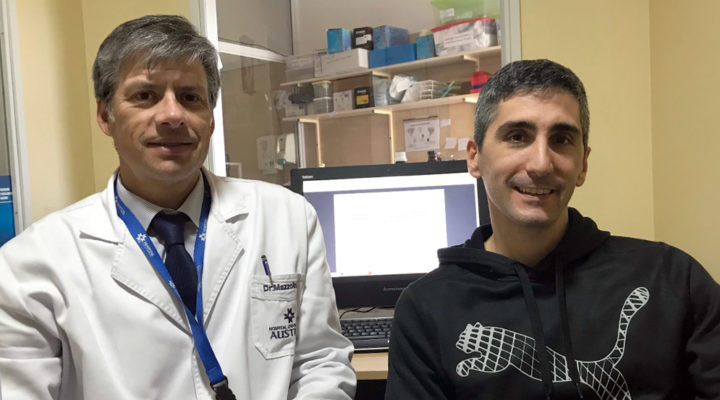Biological and Health Sciences
Scientists study new therapies for hepatocellular carcinoma
CONICET scientists analyze epigenetic pathways of this disease and aim to develop drugs to inhibit its progression.
Hepatocellular carcinoma is a form of liver cancer and the fifth most frequent tumor in the world. There are between 750 thousand and 800 thousand cases each year. Its high mortality rate, especially when the disease is diagnosed at an advanced stage and the treatments or curative intents like liver transplant or radiofrequency ablation are not possible- makes it the second cause of death by cancer.
In these last years, the incidence of hepatocellular carcinoma in the world has raised due to an increase in the cases of cirrhosis by hepatitis B and C and by the disease of non alcoholic fatty liver associated to obesity epidemic and diabetes. For the public health point of view, hepatocellular carcinoma represents significant problem and a great therapeutic challenge.
Recent studies indicated the existence of a causal relationship between epigenetic alterations –changes in DNA structure that does not involve a modification of its sequence but can be the result of an exposition to environmental factors- and hepatocarciogeneis, what would prove that to inhibit certain epigenetic pathways could help to treat this type of tumors, particularly when they are in advanced state.
Recently, a CONICET research team at the Institute of Translational Medicine (IIMT, CONICET-AUSTRAL) with the collaboration of scientists from the United States conducted a study to know which epigenetic pathways are altered or over expressed in patients with hepatocellular carcinoma. The objective is to obtain information about possible therapeutic targets and develop treatments based on some epigenetic inhibitor. The results of the study were published in the Journal of Hepatology and Juan Bayo, CONICET assistant researcher at the IIMT is the first author of the article.
“To undertake this task we used the database of 365 patients with hepatocellular carcinoma that we took from the Cancer Genome Atlas (TCGA) –project that aims to identify the group of changes in DNA in several types of different cancer–. We managed to observe there the existence of a correlate between the activation or over expression of certain epigenetic pathways and clinic information consistent with a worst prognosis”, Guillermo Mazzolini explains. He is a CONICET principal researcher at the IIMT, coordinator of the study, and the leader of a multidisciplinary research team that has analyzed liver diseases in Argentina for more than 15 years.
Experimentation on Animal models
Once the scientist managed to lay the foundations of an association between over-expression of certain genes and a worse forecast for patients with hepatocellular carcinoma, the researchers wanted to prove the effects of the epigenetic inhibitors drugs on lines of tumor cells in vitro and in animal models in vitro. The results were positive.
“After testing successfully different epigenetic inhibitors in cellular models, we provided mice that had hepatocellular carcinoma with a treatment which contained an inhibitor called JIB-04 and observed that it does not only have a strong effect on the primary tumor but also on the satellites –lesions linked to the aggressiveness of the disease. So we proved that in experimental models in vitro and in vivo (in animals), the modulation of the epigenetic pathways can be linked to a beneficial effect”, the researcher affirms. “Although the finding is significant and raises expectations, it is important to stress the fact that this is pre-clinic experimentation and we need an undetermined time to transfer these results to the patients with hepatocellular carcinoma.”
Another contribution of the scientists who participate in the study is the possibility of having found molecular markers that serve to know if a patient with hepatocellular carcinoma can have a worse or better evolution after the extirpation of the tumor.
“Although there are now some elements that indicate if a tumor is more or less aggressive, it is still necessary to find the molecular marks to be able to provide a prognosis on solid bases. In this study, we managed to identify for the first time 4 genes whose over-expression in patients with hepatocellular carcinoma is linked to a worse prognosis, that is to say, a short-term survival”, Mazzolini concludes.
By Miguel Faigón
About the study:
Juan Bayo. Assistant researcher. IIMT.
Esteban J. Fiore. Assistant researcher. IIMT.
Luciana M. Domínguez. IIMT.
Alejandrina Real. IIMT.
Mariana Malvicini. Associate researcher. IIMT.
Manglio Rizzo. IIMT.
Catalina Atorrasagasti. Associate researcher. IIMT.
Mariana G. García. Independent researcher. IIMT.
Josepmaria Argemi. University of Pittsburgh Medical Center (Pittsburgh, Estados Unidos)
Elisabeth D. Martínez. UT Southwestern Medical Center (Dallas, Estados Unidos)
Guillermo D. Mazzolini. Principal researcher. IIMT and Hospital Universitario Austral.
